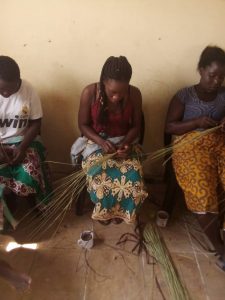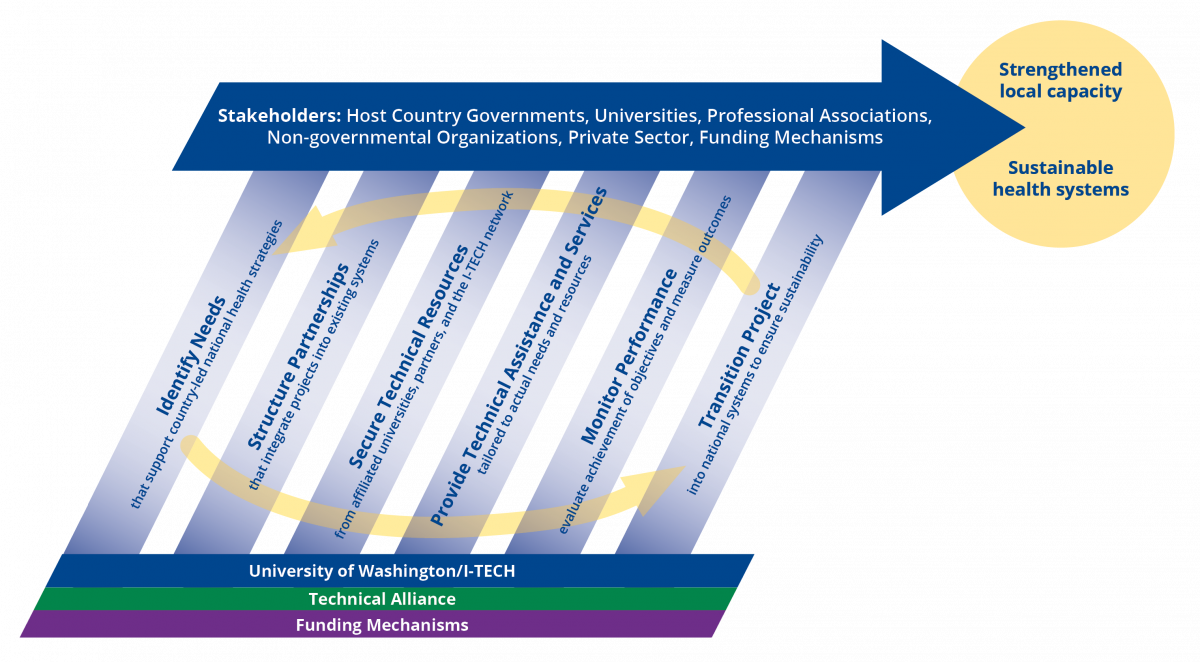
Young mothers enrolled in the DREAMS program in the Zambezi region of Namibia had the opportunity to learn the traditional art of basket weaving through a series of craft-skills trainings facilitated by the International Training and Education Center for Health (I-TECH) and the Integrated Rural Development and Nature Conservation (IRDNC).
The all day, weeklong trainings taught the young women the basics of basket weaving and also empowered them to create marketable items that could lead to greater economic independence. For the trainings, I-TECH and IRDNC invited a Master Weaver to teach women about the technique, the types of natural fibers and dyes, and the necessary tools used in the craft. All of the women who participated in a training made at least one basket by the end of the week.
“Basket weaving is a traditional craft in this area and it is often a source of income for families,” explains Sharon Zambwe, Program Lead for DREAMS Zambezi. “One of the best parts about this program is that it not only teaches women the skills needed for basket weaving but it also connects them to a market for their works, and with each other for ongoing support and encouragement.”
The baskets that the young women crafted were made available for purchase during an event marking the end of their training. The event was attended by representatives from the Society of Family Health; Zambezi Regional Council; and Regional Ministries of Health & Social Services, Education, Arts & Culture, and Youth and Sport. The special event provided attendees with a background of the DREAMS program and included a keynote address from the special advisor of the Zambezi Governor’s Office who presented the future vision of the DREAMS program.

I-TECH launched the DREAMS program in the Khomas region in February 2018 and expanded the program to the Zambezi region in June 2018. Since the launch, I-TECH has enrolled over 20,000 girls and young women aged 9-24 years old in the program. DREAMS is a PEPFAR-funded initiative that aims to give girls and women the tools to be Determined, Resilient, Empowered, AIDS-free, Mentored, and Safe (DREAMS). The program not only addresses the HIV epidemic through prevention and treatment, but it also focuses on the structural drivers of the epidemic, such as gender-based violence (GBV) and poverty.
“The DREAMS program has been able to provide girls and young women with the mentoring and social support needed to help encourage them to make positive and healthy decisions in their everyday lives,” says Ellen MacLachlan, DREAMS Program Director for I-TECH. “The activities in Khomas and Zambezi have had a profound impact on the girls and young women in the program. Economic strengthening activities such as the basket weaving classes can directly empower women by giving them a way to make their own money so they are less dependent on a male partner, especially one who may put her at risk of HIV.”
Since the DREAMS program first launched in the Zambezi region, it has provided social and health services (such as pre-exposure prophylaxis, or PrEP) as well as HIV/GBV prevention education to girls and young women and in August 2019, the program expanded into the field of economic empowerment by providing craft-skills trainings. Since the beginning of the service expansion, I-TECH and IRDNC have trained 82 young mothers, aged 15-24, in the art of basket weaving.
While the craft-skills training program in Zambezi is still in its infancy, there are plans to expand the scope of the training to incorporate other crafts skills such as clay pot artistry, knitting, and needlework. In addition to expanding the scope, DREAMS Zambezi plans to partner with tourism organizations as a way for the women participating in future trainings to showcase and sell their wares.
“We have been impressed with the response from the women who have participated in the program over these past four weeks,” says Zambwe. “We can’t wait to expand this program to incorporate more skills that will benefit not only the young women and their families but the community.”
